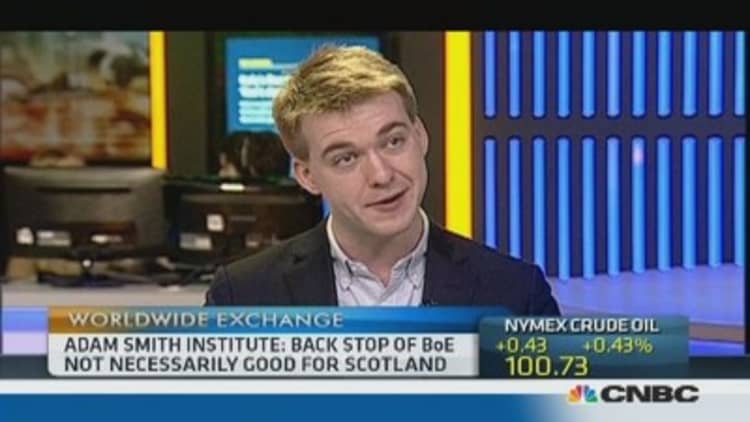The impassioned independence arguments of the Scottish Nationalist Party (SNP) are beginning to stir voters, according to a poll released on Wednesday.
There was a month-on-month increase of 1 percentage point after 29 percent of Scots planned to vote 'yes' in a referendum on whether Scotland should become independent of the rest of the U.K. on September 18 this year. Those voting 'no' fell 1 percentage point month on month to 41 percent and the rest were undecided.
About 74 percent of Scots said they will definitely vote in the referendum in September, a figure that has climbed from 65 percent since September.
"The increase in the proportion who claim they are certain to vote is an indication that more and more people are realising the importance of this referendum and are becoming increased engaged in the process" head of TNS Scotland Tom Costley said in a statement.
"Many undecided voters are telling us that they will definitely cast their vote, and how the campaigns address their interests is likely to have a big influence on their final outcome."
Read More Scotland independence: Widnae it work?
Scottish Deputy Minister Alex Salmond used his speech at the SNP conference in Aberdeen to lambast the gloomy arguments of "no" campaigners.
"The more the people of Scotland hear the case for No, the more likely they are to vote Yes."
"And no wonder. They are the most miserable, negative,depressing and thoroughly boring campaign in modern political history."

It seems that a series of warnings against an independent Scotland have failed to resonate with voters.
"The emphasis of the No campaign on the negative consequences of independence has failed to convince undecided voters, and seems to have rather alienated them," Florian Otto, head of Europe and Central Asia at Maplecroft, told CNBC via email.
The SNP has clashed with the UK government over a number of fiscal and monetary issues surrounding Scotland's independence, including the use of the pound, what the new country's deficit would be and the value of revenues from oil drilling in the North Sea.
And a number of business and industry leaders have also weighed in on the debate.
Aerospace and Defense
Britain's aerospace and defense industries have raised concerns over the impact of Scottish independence on their ability to compete globally.
Paul Everitt, chief executive of aerospace and defence trade organisation, ADS Group said: "There is genuine uncertainty about the impact of independence on the UK's – and Scotland's – international influence, export opportunities and inward investment".
Read More Chief executives: Scottish independence is bad for business
A Scottish government spokeswoman hit back at the claims telling the UK media: "The latest figure for defense spending in Scotland (2007/08) is £1.4 billion less than our current contribution of £3.3 billion to UK defense and security budgets".
"With independence, Scottish defence spending will provide security as well as increasing economic benefits and employment on which we currently miss out."
Big business
This echoes concerns raised by businesses over splitting operations across borders, if most Scots vote "yes" in September.
The majority of Scottish businesses have said that the "risks of independence outweigh benefits" in a study conducted by the University of Edinburgh Business School as part of an ESRC research fellowship.
"Uncertainty generally poses the biggest challenge forbusiness" the report said. Among the main concerns were "currency and regulation, followed by personal taxes and EU membership."
Earlier this year a number of big financial firms revealed contingency plans for the event of Scotland's independence.
Scottish investment firm Alliance Trust said in its annual statement that it planned to set up registered companies in the UK and Scottish insurer Standard Life revealed it could shift business south of the border.
"While [an independent] Scotland would benefit from higher oil and gas revenues, this would likely be more than offset by most of its financial services sector relocating south of the border," Otto told CNBC via email.
Follow us on Twitter: @CNBCWorld

